What does a transformative, earth-honouring Christianity look like at ground level and lived out in daily action? Reforms of personal habits—such as recycling, eating locally and shopping responsibly—are important steps. But we’ll need to embody a more vibrant Christian environmental ethic if we are to become the people God yearns for us to be, and to address the overwhelming ecological crisis facing us today. We’ll need to do something wild and take on the yoke of watershed discipleship.
Watershed discipleship? It’s an intriguing, provocative term that blends two domains rarely joined in our imaginations: one scientific, the other religious. Yet it’s this kind of paradigm—both data-driven and deeply spiritual, both ancient and new—that Jesus followers will need to adopt in the coming decades if we are to play any significant role in our planet’s healing.
What is watershed discipleship? Activist and theologian Ched Myers gives the term two meanings, and I’ve added a third. In a nutshell, watershed discipleship means:
- Being disciples during this watershed moment. Interlocking and immediate crises of climate change, diminishing resources and widening ecological degradation compel us to make environmental justice and sustainability integral to everything we do as disciples of Jesus, asserts Myers.
- Being disciples within our watersheds. Myers suggests that followers of Jesus today must be people of specific places, who root their prayers and practices in actual watersheds of care.
- Being disciples of our watersheds. It is the “re-placed” identity we as a species must rediscover if we are to unshackle ourselves from the ecocidal, “dis-placed” path of empire. We need to go to school on our surroundings, as the ancients did, and learn core life truths from our own home places. As followers of Jesus, we need to treat our region as rabbi and teacher as well.
Your way is my way
My friend Stephanie came by yesterday to plug in her electric car. She once lived next door to us and we shared a washing machine, but now that we live 32 kilometres apart we’ve become her way station. She can do errands and bring her kid to gymnastics, and then visit with us and top off her battery in case it’s a bit low for the return trip home.
Out here in our little mountain town, electric cars are still oddities. Convenient charging stations and smooth level roads are rare or nonexistent. But Stephanie’s household and mine are partners striving for a better kind of life together, so we get creative. When she arrives, I drag her 220-volt extension cord through my house and plug it into the outlet for our clothes dryer, which we rarely use due to the abundance of Taos, N.M., sun that strikes our backyard clothesline.
This time when she visited we updated each other on our latest findings: she’d discovered a farm in our region that sold flour from wheat it had grown and ground, and I told her about the barley I’d planted this winter so that we could provide our own fodder to our milk goats, instead of importing so much hay from farther away.
Stephanie’s household and mine are on a journey of watershed living together. It’s slow and we stumble, but we help one another on the path. Inspired by the ancient biblical example of Ruth, we’re beginning to say your way is my way. We’re making a few steps on the path of energy descent and community resilience, and learning to live a bit more within our niche as citizens of our watershed.
Walking the watershed way
We’re not journeying alone, either. Earlier this year, I was licensed by Mennonites in New Mexico and Colorado to be an educator and capacity-builder for watershed discipleship in the way of Jesus. What does that mean? I’m not sure, exactly, but I mean to find out. My first step will be to visit with existing congregations and groups in the larger region to find out what they are already doing and highlight some of their place-based practices they might want to share with others.
Next, I want to encourage the communities in our Mountain States region to enter into a 10-year exploration with us, an invitation to life-change that we’re calling “Walk the Watershed Way.” How can we each—in our own context—free ourselves from harmful lifeways and transition into a better future together by altering habits, innovating systems and living lighter on the earth?
We’re living into this question in 2015 by initiating a decade-long period of shared exploration, initiating and observing significant change in our own lives and communities. Each year, participating communities will craft an annual reflection and then share it with other communities, describing the best practices, struggles, questions and surprises that emerged during the year. Peer communities will help develop measurable next steps and guiding questions, and together we’ll head into the next cycle.
Why did we choose 10 years? Three reasons:
- It’s a timeframe that encourages continued attention and accountability. Our earth is going to undergo significant change in the next 10 years.
- It gives a sense of practical urgency dosed with a healthy forgiveness. It makes us plan, prioritize and prepare without feeling defeated. The kind of structural changes we need to make—in areas such as food sourcing, housing, energy, transport, community economics—are not going to happen overnight, or even in a year.
- 2025 marks the 500th anniversary of Anabaptism. Five centuries ago, a little bit after Martin Luther tacked his protests on the door of the Catholic Church, the forefathers of the Mennonites and Amish broke the law and scandalized Catholicism by baptizing one another and forgiving one another’s sins, without needing professional priests to do it for them. Five hundred years after these transformative actions, it seems fitting to have a reckoning, and ask: As followers of Jesus, what are we doing today that is transformative and earth-honouring?
Choosing your own path
Where will this exploration of the Watershed Way lead our faith communities over the next decade? I’m guessing that no two communities will follow the same path. For groups located in dense urban areas, walking the Watershed Way may turn both prophetic and political, such as what is happening in Detroit, where some faith communities are resisting powerful interests that willingly accept unpaid water bills by corporations but turn off the taps of the poor. Others might enter into a bioregional food covenant like Stephanie and I are doing here in Taos, and see how we can adapt to what is available in our area.
I am a Mennonite, an environmentalist and an unapologetic follower of Jesus. But where I live in northern New Mexico, the Watershed Way is practised more deeply by other traditions. I’ll be joining an ancient river, not creating something new. Over the next decade, I’ll be learning from my indigenous neighbours at Taos Pueblo about how they have been able to walk the Watershed Way in this bioregion for thousands of years; I’ll be learning from traditional Hispanic farmers and ranchers about how they have been practising the Watershed Way here these past five centuries. I’m guessing that where you live you have mentors and guides, too.
Watershed living is my path of earth-honouring, Jesus-following discipleship. For me, as a “half-done” Christian, it is not an intellectual exercise; it is experiential and transformational, a learning-by-doing that results in liberated lifeways and systemic change.
Is this path for you? That’s for you to decide. God’s gifts of clean water, pure air and good soil are in the balance; our industrial society is damaging them at a horrific pace. How can we half-done Christians change our ways and become the people God yearns for us to be? Whatever path you choose in these transition times, I believe that it must be both personal and political, social and spiritual, individual and communal.
What will it be for you, in your place, in your situation? Perhaps you’ll encourage your church to “go green” with solar panels and encourage your electric company to provide cleaner energy. Perhaps you’ll harvest roof rainwater and advocate for clean water laws. Maybe you’ll get a few folks to commit to a bicycle-based lifestyle and fight against fracking. Or maybe you’ll grow more of your own food and support local food hubs connecting producers to consumers, and help low-income people get healthy, fresh food. Maybe you’ll travel into the woods for weeks at a time, and discover you need a lot less from industrial society than you thought.
We’re heading into transition times, my friends, an unknown wilderness for which there are no maps, only sketches. God is doing something new and the Spirit is troubling the waters. As Ched Myers observes, whenever the Holy Spirit is poured out in human history, traditions are disturbed and institutions disrupted, because our untamed God is not a domesticated deity, but the One who liberates us from our enslaved condition.
Todd Wynward is a public school founder, wilderness educator and Mennonite organizer for watershed discipleship who lives with his family in Taos, N.M. His new book, Rewilding the Way: Break Free to Follow an Untamed God, was published this fall by Herald Press. More of his writings and doings can be found at leavenrising.com. For a companion article on this topic, visit canadianmennonite.org/displaced-and-denatured.
Meetinghouse is an affiliation of Mennonite and Brethren publications in Canada and the U.S.
For discussion
1. What is your closest river? How large is its watershed? How does the river benefit your community? Is the health of the river important to your community? How does your municipality work at keeping the water clean and safe?
2. Todd Wynward assumes that there is an “overwhelming ecological crisis facing us today.” Where do you see that crisis in your community? Who are the people in your congregation who believe that working at healing the planet is imperative for Jesus’ disciples?
3. How important is it for Christians to work at reducing their consumption of non-renewable resources? Have we been guilty of regarding creation as a commodity, rather than as a gift from God? Do you agree with Wynward that we should “make environmental justice and sustainability integral to everything we do as disciples of Jesus”?
4. How has your congregation been working at honouring the earth? Have you personally tried to change your habits to live lighter on the earth? Is “going green” gaining momentum in your watershed?
—By Barb Draper

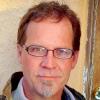
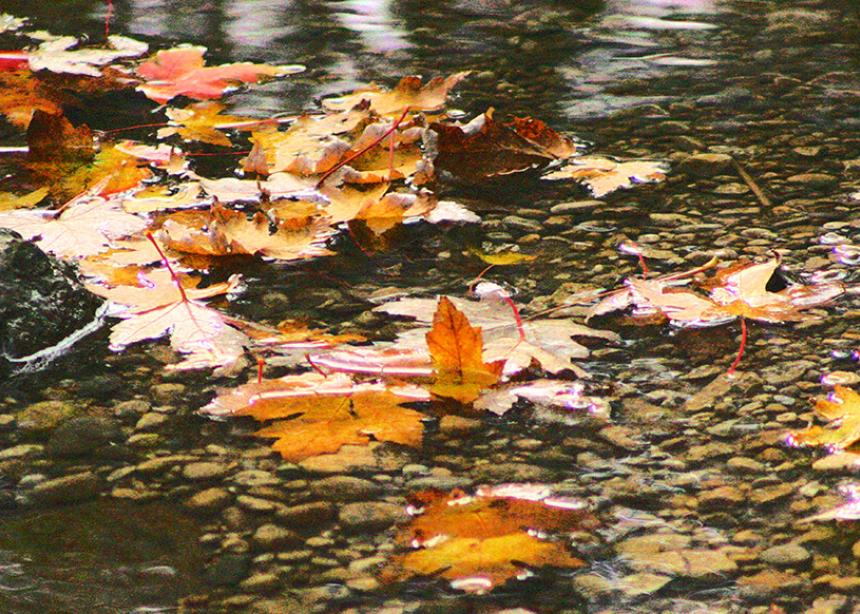

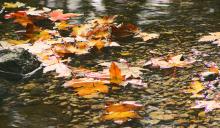
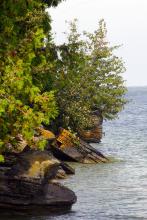
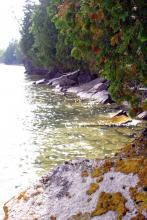
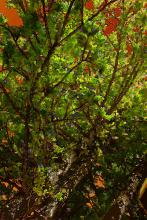
Add new comment
Canadian Mennonite invites comments and encourages constructive discussion about our content. Actual full names (first and last) are required. Comments are moderated and may be edited. They will not appear online until approved and will be posted during business hours. Some comments may be reproduced in print.